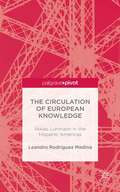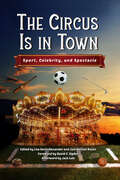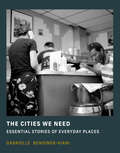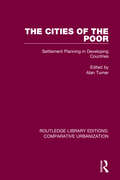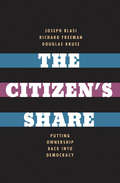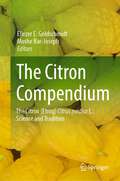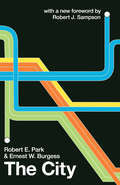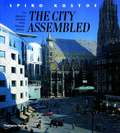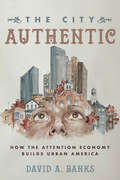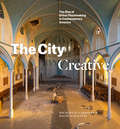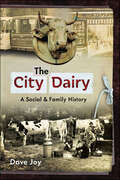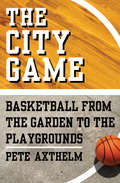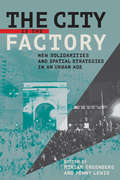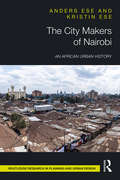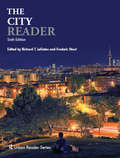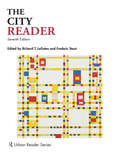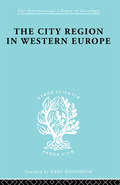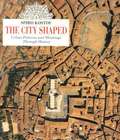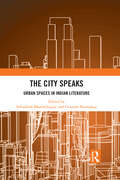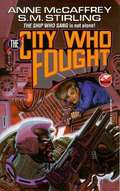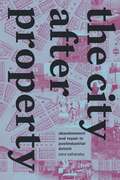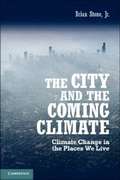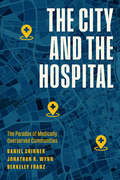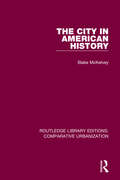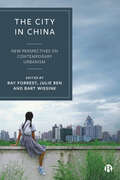- Table View
- List View
The Circulation of European Knowledge: Niklas Luhmann in the Hispanic Americas
by Leandro Rodriguez MedinaThis book studies the circulation of social knowledge by focusing on the reception of Niklas Luhmann's systems theory in Hispanic America. It shows that theories need active involvement from scholars in the receiving field in order to travel.
The Circus Is in Town: Sport, Celebrity, and Spectacle
by Jack LuleContributions by Lisa Doris Alexander, Matthew H. Barton, Andrew C. Billings, Carlton Brick, Ted M. Butryn, Brian Carroll, Arthur T. Challis, Roxane Coche, Curtis M. Harris, Jay Johnson, Melvin Lewis, Jack Lule, Rory Magrath, Matthew A. Masucci, Andrew McIntosh, Jorge E. Moraga, Leigh M. Moscowitz, David C. Ogden, Joel Nathan Rosen, Kevin A. Stein, and Henry YuIn this fifth book on sport and the nature of reputation, editors Lisa Doris Alexander and Joel Nathan Rosen have tasked their contributors with examining reputation from the perspective of celebrity and spectacle, which in some cases can be better defined as scandal. The subjects chronicled in this volume have all proven themselves to exist somewhere on the spectacular spectrum—the spotlight seemed always to gravitate toward them. All have displayed phenomenal feats of athletic prowess and artistry, and all have faced a controversy or been thrust into a situation that grows from age-old notions of the spectacle. Some handled the hoopla like the champions they are, or were, while others struggled and even faded amid the hustle and flow of their runaway celebrity. While their individual narratives are engrossing, these stories collectively paint a portrait of sport and spectacle that offers context and clarity. Written by a range of scholarly contributors from multiple disciplines, The Circus Is in Town: Sport, Celebrity, and Spectacle contains careful analysis of such megastars as LeBron James, Tonya Harding, David Beckham, Shaquille O’Neal, Maria Sharapova, and Colin Kaepernick. This final volume of a project that has spanned the first three decades of the twenty-first century looks to sharpen questions regarding how it is that reputations of celebrity athletes are forged, maintained, transformed, repurposed, destroyed, and at times rehabilitated. The subjects in this collection have been driven by this notion of the spectacle in ways that offer interesting and entertaining inquiry into the arc of athletic reputations.
The Cities We Need: Essential Stories of Everyday Places
by Gabrielle Bendiner-VianiAn expressive book of prose and photographs that reveals the powerful ways our everyday places support our shared belonging.Where would you take someone on a guided tour of your neighborhood? In The Cities We Need, photographer and urbanist Gabrielle Bendiner-Viani introduces us to the complex, political, and eminently personable stories of residents who answered this question in Brooklyn, New York, and Oakland, California. Their universal stories and Bendiner-Viani&’s evocative images illuminate what&’s at stake in our everyday places—from diners to churches to donut shops. In this culmination of two decades of research and art practice, Bendiner-Viani intertwines the personal, historical, and photographic to present us with placework, the way that unassuming places foster a sense of belonging and, in fact, do the essential work of helping us become communities.In this unique book, Bendiner-Viani makes visible how seemingly unimportant places can lay the foundation for a functional interconnected society, so necessary for both public health and social justice. The Cities We Need explores both what we gain in these spaces and what we risk losing as they are threatened by gentrification, large-scale development, and most recently the COVID-19 pandemic. Ultimately, Bendiner-Viani shows us how to understand ourselves as part of a shared society, with a shared fate; she shows us that everyday places can be the spaces of liberation in which we can build the cities we need.
The Cities of the Poor: Settlement Planning in Developing Countries
by Alan TurnerOriginally published in 1980, this book was written by consultants in urban development with wide experience in the developing world and is a source book aimed at advisers (often from developed countries) who assist with urban planning matters on behalf of multi-lateral agencies such as the World Bank. It presents a style of consultancy which accepts that not all the problems of settlement planning in developing countries can be solved by the transfer of Western methods. Although the book concentrates on the techniques and methods which have been found to be effective in the field, it also argues for a new philosophy of consultancy, in which consultants work with local staff and using the ingenuity and spirit of enterprise among the communities themselves.
The Citizen's Share
by Douglas L. Kruse Richard B. Freeman Joseph R. BlasiThe idea of workers owning the businesses where they work is not new. In America's early years, Washington, Adams, Jefferson, and Madison believed that the best economic plan for the Republic was for citizens to have some ownership stake in the land, which was the main form of productive capital. This book traces the development of that share idea in American history and brings its message to today's economy, where business capital has replaced land as the source of wealth creation. Based on a ten-year study of profit sharing and employee ownership at small and large corporations, this important and insightful work makes the case that the Founders' original vision of sharing ownership and profits offers a viable path toward restoring the middle class. Blasi, Freeman, and Kruse show that an ownership stake in a corporation inspires and increases worker loyalty, productivity, and innovation. Their book offers history-, economics-, and evidence-based policy ideas at their best.
The Citron Compendium: The Citron (Etrog) Citrus medica L.: Science and Tradition
by Moshe Bar-Joseph Eliezer E. GoldschmidtThis comprehensive book covers the theoretical and practical aspects of citron trees and fruit. The citron (Citrus medica L.), one of the three primary species ancestral to most citrus types, is used for traditional medicine and is highly revered in the Jewish religion during the Tabernacles feast, referred to by the name 'Etrog'. This book’s three sections address biology (botany, genomics, Chinese and Mediterranean citrons, diseases, pests, and horticulture), tradition (Talmudic discourse, mysticism, medicine, literature, art, food, and beverages) and history (archaeology, trade, grafting controversies); these sections are supplemented by a glossary and pictorial album. The 22 chapters, some new and some translated and considerably expanded from the 2018 Hebrew edition, were written by world-renowned specialists from Israel, Italy, France, the U.S.A., China and Australia. The book is written in an accessible scientific style aimed at a wide range of readers.
The City (Heritage of Sociology Series)
by Robert E. Park Ernest W. BurgessFirst published in 1925, The City is a trailblazing text in urban history, urban sociology, and urban studies. Its innovative combination of ethnographic observation and social science theory epitomized the Chicago school of sociology. Robert E. Park, Ernest W. Burgess, and their collaborators were among the first to document the interplay between urban individuals and larger social structures and institutions, seeking patterns within the city’s riot of people, events, and influences. As sociologist Robert J. Sampson notes in his new foreword, though much has changed since The City was first published, we can still benefit from its charge to explain where and why individuals and social groups live as they do.
The City Assembled: The Elements of Urban Form Through History
by Spiro Kostof Greg Castillo Richard TobiasThe City Assembled is a history of the elements of cities: streets, public places, urban divisions (religious, political, and social), and the frontiers of city and countryside. Kostof follows the evolution of city components to modern times. He discusses "urban process": the effect on cities of natural disasters like the Great Fire of London and the Lisbon earthquake, war, and comprehensive redevelopment, compared with traditional patterns of growth and change. The current recovery from modernist extremes has made us look again at what we treasure in traditional urban life, and how we can recharge the old forms with contemporary common sense. Over 300 drawings, prints, paintings, and photographs help to tell the story, illustrating both patterns and uses, from the colonnaded streets of ancient Palmyra to gentrified London squares. A fitting testament to the wide-ranging intellect of Professor Kostof, The City Assembled is at once an exercise in architectural and social history, a case study for the present, and a pointer for the future. 346 illustrations, 40 in color.
The City Authentic: How the Attention Economy Builds Urban America
by David A. BanksThe first book to explore how our cities gentrify by becoming social media influencers—and why it works. Cities, like the people that live in them, are subject to the attention economy. In The City Authentic, author David A. Banks shows how cities are transforming themselves to appeal to modern desires for authentic urban living through the attention-grabbing tactics of social media influencers and reality-TV stars. Blending insightful analysis with pop culture, this engaging study of New York State’s Capital Region is an accessible glimpse into the social phenomena that influence contemporary cities. The rising economic fortunes of cities in the Rust Belt, Banks argues, are due in part to the markers of its previous decay—which translate into signs of urban authenticity on the internet. The City Authentic unpacks the odd connection between digital media and derelict buildings, the consequences of how we think about industry and place, and the political processes that have enabled a new paradigm in urban planning. Mixing urban sociology with media and cultural studies, Banks offers a lively account of how urban life and development are changing in the twenty-first century.
The City Creative: The Rise of Urban Placemaking in Contemporary America
by Michael H. Carriere David SchalliolIn the wake of the Great Recession, American cities from Philadelphia to San Diego saw an upsurge in hyperlocal placemaking—small-scale interventions aimed at encouraging greater equity and community engagement in growth and renewal. But the projects that were the most successful at achieving these lofty ambitions weren’t usually established by politicians, urban planners, or real estate developers; they were initiated by community activists, artists, and neighbors. In order to figure out why, The City Creative mounts a comprehensive study of placemaking in urban America, tracing its intellectual history and contrasting it with the efforts of people making positive change in their communities today. ? Spanning the 1950s to the post-recession 2010s, The City Creative highlights the roles of such prominent individuals and organizations as Jane Jacobs, Christopher Alexander, Richard Sennett, Project for Public Spaces, and the National Endowment for the Arts in the development of urban placemaking, both in the abstract and on the ground. But that’s only half the story. Bringing the narrative to the present, Michael H. Carriere and David Schalliol also detail placemaking interventions at more than 200 sites in more than 40 cities, combining archival research, interviews, participant observation, and Schalliol’s powerful documentary photography. Carriere and Schalliol find that while these formal and informal placemaking interventions can bridge local community development and regional economic plans, more often than not, they push the boundaries of mainstream placemaking. Rather than simply stressing sociability or market-driven economic development, these initiatives offer an alternative model of community-led progress with the potential to redistribute valuable resources while producing tangible and intangible benefits for their communities. The City Creative provides a kaleidoscopic overview of how these initiatives grow, and sometimes collapse, illustrating the centrality of placemaking in the evolution of the American city and how it can be reoriented to meet demands for a more equitable future.
The City Dairy: A Social and Family History
by Dave JoyThe early nineteenth century witnessed the mass movement of people from Britain’s countryside into its burgeoning towns and cities; people came to the city in search of work. This prompted many dairy farmers to follow suit and move themselves, their family and their cows into the country’s growing metropolises, where they opened the first generation of city dairies. In the 1830s, transportation in Britain was revolutionized by the coming of the railways, enabling foodstuffs, including milk, to be transported in bulk from countryside to city. Large dairy companies took advantage of this opportunity, opening a new generation of retail dairies. The demand for milk was so great that some cities boasted a dairy at the end of every street. For the next hundred years the cowkeepers fought a rear-guard action against the mighty corporate dairies and their attempts to monopolize the liquid milk market. The cowkeepers continued to produce their own milk, selling it — ‘fresh from the cow’ — over the dairy counter and out on the milk round. These dairies were kept in the family, handed down through successive generations. Despite surviving two World Wars, the rapid technological, social and economic changes that followed, brought about the demise of the traditional cowkeeper. But the city dairy continued as a family business, working as part of a national distribution network, overseen by the Milk Marketing Board. Out on the round, the family dairyman was almost indistinguishable from the corporate milkman. The sixties and seventies saw the arrival of the Supermarket, a game-changer in retailing. To survive, the city dairy had to change once more. It expanded its offer and seamlessly joined the ranks of those other most British of institutions: the Corner Shop and the Convenience Store.
The City Game: Basketball from the Garden to the Playgrounds
by Pete Axthelm&“The master prose stylist portrays parallel basketball worlds in New York City: Madison Square Garden . . . and the playgrounds of Harlem&” (Sports Illustrated). The New York Knickerbockers, one of the NBA&’s charter franchises, played professionally for twenty-four years before winning their first championship in 1970, defeating the Los Angeles Lakers in a thrilling seven-game series. Those Knicks, who won again in 1973, became legends, and captivated a city that has basketball in its blood. But this book is more than a history of the championship Knicks. It is an exploration of what basketball means to New York—not just to the stars who compete nightly in the garden, but to the young men who spend their nights and weekends perfecting their skills on the concrete courts of the city&’s parks. Basketball is a city game, and New York is the king of cities.
The City Is the Factory: New Solidarities and Spatial Strategies in an Urban Age
Urban public spaces, from the streets and squares of Buenos Aires to Zuccotti Park in New York City, have become the emblematic sites of contentious politics in the twenty-first century. As the contributors to The City Is the Factory argue, this resurgent politics of the square is itself part of a broader shift in the primary locations and targets of popular protest from the workplace to the city. This shift is due to an array of intersecting developments: the concentration of people, profit, and social inequality in growing urban areas; the attacks on and precarity faced by unions and workers' movements; and the sense of possibility and actual leverage afforded by local politics and the tactical use of urban space. Thus, "the city"—from the town square to the banlieu—is becoming like the factory of old: a site of production and profit-making as well as new forms of solidarity, resistance, and social reimagining.We see examples of the city as factory in new place-based political alliances, as workers and the unemployed find common cause with "right to the city" struggles. Demands for jobs with justice are linked with demands for the urban commons—from affordable housing to a healthy environment, from immigrant rights to "urban citizenship" and the right to streets free from both violence and racially biased policing. The case studies and essays in The City Is the Factory provide descriptions and analysis of the form, substance, limits, and possibilities of these timely struggles.ContributorsMelissa Checker, Queens College and the Graduate Center of the City University of New York; Daniel Aldana Cohen, University of Pennsylvania; Els de Graauw, Baruch College, City University of New York; Kathleen Dunn, Loyola University ChicagoShannon Gleeson, Cornell University; Miriam Greenberg, University of California, Santa Cruz; Alejandro Grimson, Universidad de San Martín (Argentina); Andrew Herod, University of Georgia; Penny Lewis, Joseph S. Murphy Institute for Worker Education and Labor Studies, City University of New York; Stephanie Luce, Joseph S. Murphy Institute for Worker Education and Labor Studies, City University of New York; Lize Mogel, artist and coeditor of An Atlas of Radical Cartography; Gretchen Purser, Maxwell School of Citizenship and Public Affairs, Syracuse University
The City Makers of Nairobi: An African Urban History
by Anders Ese Kristin EseThe City Makers of Nairobi re-examines the history of the urban development of Nairobi in the colonial period. Although Nairobi was a colonial construct with lasting negative repercussions, the African population’s impact on its history and development is often overlooked. This book shows how Africans took an active part in making use of the city and creating it, and how they were far from being subjects in the development of a European colonial city. This re-interpretation of Nairobi’s history suggests that the post-colonial city is the result of more than unjust and segregative colonial planning. Merging historical documentation with extensive contemporary urban theory, this book provides in-depth knowledge of the key historical roles played by locals in the development of their city. It argues that the idea of agency, a popular inroad to urban development today, is not a current phenomenon but one that has always existed with its many social, spatial, and physical ramifications. This is an ideal read for upper-level undergraduate and graduate students studying the history of urban development and theories, providing an in-depth case study for reference. The City Makers of Nairobi broaches interdisciplinary themes important to urban planners, social scientists, historians, and those working with popular settlements in cities across the world.
The City Reader (Routledge Urban Reader Series)
by Frederic Stout Richard T. LeGatesThe sixth edition of the highly successful The City Reader juxtaposes the very best classic and contemporary writings on the city to provide the comprehensive mapping of the terrain of Urban Studies and Planning old and new. The City Reader is the anchor volume in the Routledge Urban Reader Series and is now integrated with all ten other titles in the series. This edition has been extensively updated and expanded to reflect the latest thinking in each of the disciplinary areas included and in topical areas such as compact cities, urban history, place making, sustainable urban development, globalization, cities and climate change, the world city network, the impact of technology on cities, resilient cities, cities in Africa and the Middle East, and urban theory. The new edition places greater emphasis on cities in the developing world, globalization and the global city system of the future. The plate sections have been revised and updated. Sixty generous selections are included: forty-four from the fifth edition, and sixteen new selections, including three newly written exclusively for The City Reader. The sixth edition keeps classic writings by authors such as Ebenezer Howard, Ernest W. Burgess, LeCorbusier, Lewis Mumford, Jane Jacobs, and Louis Wirth, as well as the best contemporary writings of, among others, Peter Hall, Manuel Castells, David Harvey, Saskia Sassen, and Kenneth Jackson. In addition to newly commissioned selections by Yasser Elshestawy, Peter Taylor, and Lawrence Vale, new selections in the sixth edition include writings by Aristotle, Peter Calthorpe, Alberto Camarillo, Filip DeBoech, Edward Glaeser, David Owen, Henri Pirenne, The Project for Public Spaces, Jonas Rabinovich and Joseph Lietman, Doug Saunders, and Bish Sanyal. The anthology features general and section introductions as well as individual introductions to the selected articles introducing the authors, providing context, relating the selection to other selection, and providing a bibliography for further study. The sixth edition includes fifty plates in four plate sections, substantially revised from the fifth edition.
The City Reader (Routledge Urban Reader Series)
by Frederic Stout Richard T. LeGatesThe seventh edition of the highly successful The City Reader juxtaposes the very best classic and contemporary writings on the city. Sixty-three selections are included: forty-five from the sixth edition and eighteen new selections, including three newly written exclusively for The City Reader. The anthology features a Prologue essay on "How to Study Cities", eight part introductions as well as individual introductions to each of the selected articles. The new edition has been extensively updated and expanded to reflect the latest thinking in each of the disciplinary and topical areas included, such as sustainable urban development, globalization, the impact of technology on cities, resilient cities, and urban theory. The seventh edition places greater emphasis on cities in the developing world, the global city system, and the future of cities in the digital transformation age. While retaining classic writings from authors such as Lewis Mumford, Jane Jacobs, and Louis Wirth, this edition also includes the best contemporary writings of, among others, Peter Hall, Manuel Castells, and Saskia Sassen. New material has been added on compact cities, urban history, placemaking, climate change, the world city network, smart cities, the new social exclusion, ordinary cities, gentrification, gender perspectives, regime theory, comparative urbanization, and the impact of technology on cities. Bibliographic material has been completely updated and strengthened so that the seventh edition can serve as a reference volume orienting faculty and students to the most important writings of all the key topics in urban studies and planning. The City Reader provides the comprehensive mapping of the terrain of Urban Studies, old and new. It is essential reading for anyone interested in studying cities and city life.
The City Region in Western Europe (International Library of Sociology)
by Robert E DickinsonThis is Volume III of thirteen in a collection on Urban and Regional Sociology. Originally published in 1967. A basic feature of the life and organization of advanced societies is the cohesion of socio-geographic groups at various levels. There are many aspects to this field of study. For this work is selected for examination the role of the central place—be it hamlet, village, town, city, or metropolis—as a focus of human activity and organization and leadership in the service of a surrounding tributary area. This field of study has been called 'human ecology' in the United States and 'social morphology' in France.
The City Shaped: Urban Patterns and Meanings Through History
by Spiro KostofSpanning the ages and the globe, Spiro Kostof explores the city as a "repository of cultural meaning" and an embodiment of the community it shelters. Widely used by both architects and students of architecture, The City Shaped won the AIA's prestigious book award in Architecture and Urbanism. With hundreds of photographs and drawings that illustrate Professor Kostof's innovative ideas, this has become one of the most important works on urbanization.
The City Speaks: Urban Spaces in Indian Literature
by Goutam Karmakar Subashish BhattacharjeeThis book studies the significance and representation of the ‘city’ in the writings of Indian poets, graphic novelists, and dramatists. It demonstrates how cities give birth to social images, perspectives, and complexities, and explores the ways in which cities and the characters in Indian literature coexist to form a larger literary framework of interpretations. Drawing on the theoretical concepts of Western urban thinkers such as Henri Lefebvre, Georg Simmel, Walter Benjamin, Edward Soja, David Harvey, and Diane Levy, as well as South Asian thinkers such as Ashis Nandy, Arjun Appadurai, Vinay Lal, and Ravi Sundaram, the book projects against a seemingly monolithic and homogenous Western qualification of urban literatures and offers a truly unique and contentious presentation of Indian literature. Unfolding the urban-literary landscape of India, the volume lays the groundwork for an urban studies approach to Indian literature. It will be of great interest to scholars and students of literature, especially Indian writing in English, urban studies, and South Asian studies.
The City Who Fought (Brainship #4)
by Anne Mccaffrey S. M. StirlingSimeon was a shellperson with a mission. After a refugee ship arrived, they said that Station SSS-900 was to be in the Fist of High-Clan Kolnar. If anyone was to survive, he must help them.
The City after Property: Abandonment and Repair in Postindustrial Detroit
by Sara SafranskyIn The City after Property, Sara Safransky examines how postindustrial decline generates new forms of urban land politics. In the 2010s, Detroit government officials classified a staggering 150,000 lots—more than a third of the city—as “vacant” or “abandoned.” Analyzing subsequent efforts to shrink the Motor City’s footprint and budget, Safransky presents a new way of conceptualizing urban abandonment. She challenges popular myths that cast Detroit as empty along with narratives that reduce its historical decline to capital and white flight. In connecting contemporary debates over neoliberal urbanism to Cold War histories and the lasting political legacies of global movements for decolonization and Black liberation, she foregrounds how the making of—and challenges to—modern property regimes have shaped urban policy and politics. Drawing on critical geographical theory and community-based ethnography, Safransky shows how private property functions as a racialized construct, an ideology, and a moral force that shapes selves and worlds. By thinking the city “after property,” Safransky illuminates alternative ways of imagining and organizing urban life.
The City and the Coming Climate: Climate Change and the Places We Live
by Brian Stone Jr.This book is the first to explore the dramatic amplification of global warming underway in cities and the range of actions that individuals and governments can undertake to slow the pace of warming. A core thesis of the book is that the principal strategy currently advocated to mitigate climate change - the reduction of greenhouse gases - will not prove sufficient to measurably slow the rapid pace of warming in urban environments. Brian Stone explains the science of climate change in terms accessible to the nonscientist and with compelling anecdotes drawn from history and current events. The book is an ideal introduction to climate change and cities for students, policy makers, and anyone who wishes to gain insight into an issue critical to the future of our cities and the people who live in them.
The City and the Hospital: The Paradox of Medically Overserved Communities
by Jonathan R. Wynn Daniel Skinner Berkeley FranzA surprising look at how hospitals affect and are affected by their surrounding communities. An enduring paradox of urban public health is that many communities around hospitals are economically distressed and, counterintuitively, medically underserved. In The City and the Hospital two sociologists, Jonathan R. Wynn and Berkeley Franz, and a political scientist, Daniel Skinner, track the multiple causes of this problem and offer policy solutions. Focusing on three urban hospitals—Connecticut’s Hartford Hospital, the flagship of the Hartford Healthcare system; the Cleveland Clinic, which coordinates with other providers for routine care while its main campus provides specialty care; and the University of Colorado Hospital, a rare example of an urban institution that relocated to a new community—the authors analyze the complicated relationship between a hospital and its neighborhoods. On the one hand, hospitals anchor the communities that surround them, often staying in a neighborhood for decades. Hospitals also craft strategies to engage with the surrounding community, many of those focused on buying locally and hiring staff from their surrounding area. On the other hand, hospitals will often only provide care to the neighboring community through emergency departments, reserving advanced medical care and long-term treatment for those who can pay a premium for it. In addition, the authors show, hospitals frequently buy neighborhood real estate and advocate for development programs that drive gentrification and displacement. To understand how urban healthcare institutions work with their communities, the authors address power, history, race, and urbanity as much as the workings of the medical industry. These varied initiatives and effects mean that understanding urban hospitals requires seeing them in a new light—not only as medical centers but as complicated urban forces.
The City in American History
by Blake McKelveyOriginally published in 1969, this book summarizes the findings of a comprehensive survey of the successive roles played by the explosive constellations of cities in American history. The book examines how and in what respects the planting and developing of cities influenced and was influenced by the colonial settlement, the achievement of independence, the occupation of the continent, the development of industrial enterprise, the challenge of foreign wars, the fluctuations of a dynamic economy and the frustrations of social and political strife in a democracy. Illuminating selections from original source documents add many graphic details and give a human dimension to this interpretation.
The City in China: New Perspectives on Contemporary Urbanism
by Ray Forrest Bart Wissink Julie RenIn 1915 Robert Park penned his seminal paper “The City: Suggestions for the investigation of human behaviour in the city environment”. This essay provided an agenda for the Chicago School of Urban Sociology, which formed the basis of urban research for decades. Given that China’s urban centres now occupy the spotlight that once belonged to American cities, Park’s essay is a platform and point of departure for this volume, which gathers together reflections from a broad range of urban China specialists to consider Park’s (ir)relevance today – for cities in China, for questions about the social life of the city and for urban research more generally. Essential for a broad range of urban studies scholars, this book is an invaluable teaching resource and a useful tool for policy-makers and planners.
